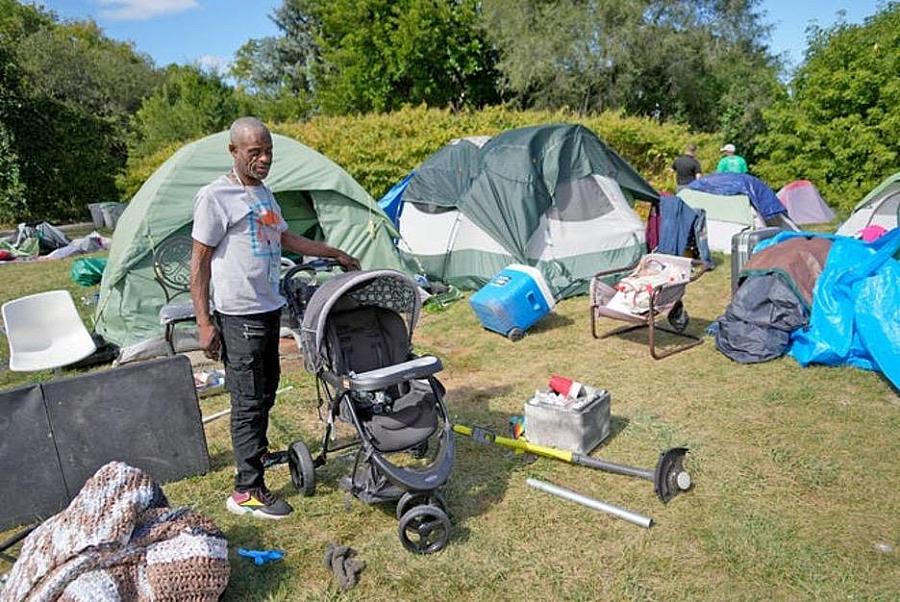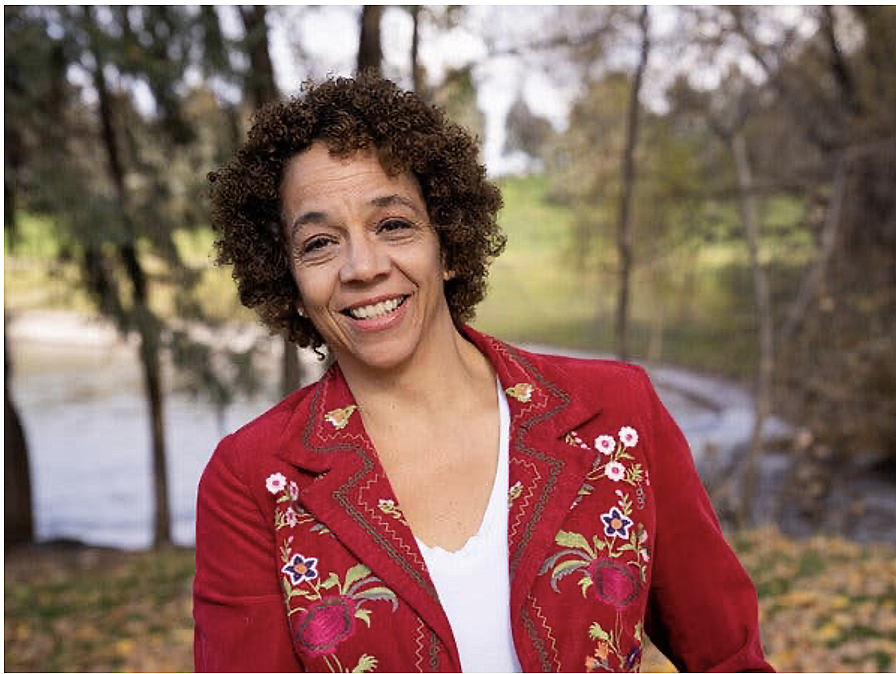The Health Divide: Proposal to jail people for stealing shopping carts underscores challenges faced by unhoused

After a group of homeless men in Wisconsin set up encampments with tents across from a men’s shelter, the shelter issued them a 30-day notice to vacate the property.
(Photo by the Milwaukee Journal Sentinel)
People experiencing homelessness in America face so many challenges.
They endure extreme cold, heat, and rain. They’re at higher risk of being assaulted by others who may wish to harm them.
This country has also made it increasingly difficult for the unhoused to find safe places to sleep, particularly in the wake of the U.S. Supreme Court’s Grants Pass decision, which allowed cities to ban sleeping and camping in public places.
In October, when a group of homeless men in Wisconsin set up encampments with tents across from a men’s shelter, the shelter issued them a 30-day notice to vacate the property. The shelter cited concerns over increased violence and drug activity in the encampment.
In another move, an Oklahoma lawmaker in January proposed legislation that would make it a crime, punishable by up to a year in jail, for anyone caught in possession of a stolen shopping cart. The bill's author argues that this law is necessary because business owners have complained that replacing shopping carts costs them thousands of dollars a year.
Meghan Mueller, CEO of the Homeless Alliance in Oklahoma City, called the bill another unnecessary obstacle for this vulnerable population. Instead of focusing on punishment, she said, a strong safety net should be established to prevent individuals from becoming homeless in the first place.
“While the intended outcome of this bill is likely to deter the use of shopping carts beyond retail settings, it will almost certainly lead to additional barriers for people who are already struggling and without many resources,” Mueller said, in a statement.
Homelessness up 18% from 2023
According to an annual assessment conducted on a designated night in January 2024, the United States recorded over 771,800 individuals experiencing homelessness.
This figure marks an 18% increase from 2023 when more than 650,000 persons were identified as residing in homeless shelters, living in public parks, or navigating life on the streets. The increase underscores the urgent necessity for more housing and more effective strategies to combat homelessness.
There are huge racial disparities in who becomes unhoused in this country. “It is perhaps not a surprise that Black Americans are at a three- to four-fold increased risk of homelessness, and that is true for many other racially and ethnically minoritized groups,” said Dr. Margot Kushel, director of the Benioff Homelessness and Housing Initiative at UCSF, while speaking recently to a group of reporters from California’s ethnic media outlets on the subject of homelessness.
Kushel said the increased risk of homelessness among Black Americans is a result of enduring racism and discrimination.
“The three-fold over representation is not because Black folks have more substance use disorders,” she said. “In fact, they have lower (rates) across the whole country. It's because of the racism you've faced your entire life.”
Whenever I discuss the unhoused, I think of Lori Teresa Yearwood, a 2022 National Fellow at the Center for Health Journalism who approached the subject of homelessness gracefully and with compassion. Yearwood, a former reporter for The Miami Herald, passed away on Sept. 17, 2023, of ovarian cancer.
Her profound understanding of homelessness was rooted in her own experience. From 2014 to early 2017, Yearwood spent time in shelters and often slept on the streets of Salt Lake City.
She endured repeated sexual assaults by a man affiliated with a homeless outreach center and was also jailed for six months for public lewdness after bathing in a river — an act born of her inability to endure the conditions of a shelter showers, which were frequently plagued by litter and unsanitary items.
She described her experience this way: “To be formerly unhoused is to be the subject of continual scrutiny, stuck in a system meant to ensure the recipient of other people’s generosity remains ‘deserving’ of it.”
In 2022, I served as Yearwood’s senior fellow during her time as a National Fellow. Her resulting project, “Denise’s Last Days,” which ran in Slate, highlights the layered barriers that harm unhoused people. Yearwood examined the life of Denise Lerma, an unhoused Los Angeles woman who died in 2022 at age 55.
“The trauma of homelessness, seen and unseen, is what killed Lerma — and it continues to prematurely end the lives of so many unsheltered people in America,” Yearwood wrote.
Yearwood and I often talked about the laws and forces that punish the unhoused, like camping bans and sit-lie ordinances that criminalize the homeless population, making it more difficult for individuals to secure stable housing.
Discrimination also plays a significant role: Without an official address, unhoused individuals can face obstacles that affect their ability to vote, find employment, and access social benefits.
Unhoused individuals also face significant health challenges. Access to dental care is challenging, and for those with physical injuries or disabilities, obtaining healthy food becomes harder. Some turn to drugs like meth to remain vigilant against dangers during the night.
And physical barriers also exist, when companies or governments use “anti-homeless spikes.” These metal studs are embedded in flat surfaces to discourage people from sleeping on them, making these areas uncomfortable and impractical for resting. This type of design is commonly found in densely populated urban areas. Many city centers use these deterrents to keep the unhoused from gathering or lingering in public spaces.
When big conventions come to an area, the unhoused are often relocated. When 50,000 people attended the Republican National Convention in Milwaukee last July, much of the downtown area was closed off, forcing out the unhoused who slept in shelters, tents, cars, and on city streets.
If Yearwood were alive, she would view the latest shopping cart bill as an assault on the unhoused, decency, and humanity.
The unhoused use shopping carts as portable storage units
Oklahoma Republican State Rep. Rande Worthen proposed the shopping cart bill and said his actions were intended to address retailers' concerns and have little to do with the unhoused population.
Worthen told Oklahoma’s News 4 that many merchants in Lawton lose over 100 shopping carts each quarter. With each cart costing between $200 and $250, these losses can accumulate significantly, even for larger retailers like Walmart.
He told the station that the missing carts often end up in the streets, creeks, waterways, and alleys, creating traffic hazards and visual blight.
Worthen's goal with the proposed bill is to establish a state statute allowing cities to incorporate it into their local ordinances. He mentioned they could implement a system where the first offense results in a warning or requires individuals to return the shopping carts.
Homeless individuals often take shopping carts because they serve as mobile storage units for their belongings, such as blankets, clothing, and food. These carts become makeshift homes on wheels, which can be vital for those living on the streets with limited access to secure storage options.
Oklahoma pastor and former state Sen. George Young said fining or locking up homeless people for having a shopping cart doesn’t address the root causes of homelessness.
“I just don’t understand this idea and this contempt that exists for the homeless … Why aren’t we writing some bills to help eliminate the need for the homeless to utilize property that way?” Young said.
We need more reporting on lives at risk
If your reporting on the unhoused focuses only on the harsh moments when temperatures drop to freezing, you are missing a wealth of important stories that illustrate their struggles and resilience throughout the year.
On that note, I’d like to share a quote from Yearwood, reflecting on her last day unhoused in early May 2017.

“Homelessness was a series of detachments — from society in general but also from my own person. Trauma rewires the mind as well as the body. On that morning in May, I knew with every cell of my being that if I did not leave homelessness, I would soon die. Either my assailant was going to stuff me in a body bag, as he had assured me he would someday, or I would succumb to the weather.”
Yearwood made a significant impact on the Center for Health Journalism community and me.
In her memory, the Center established The Lori Yearwood Fund in 2023. The fund provides grants to professional journalists for reporting on the lives and health challenges of people experiencing homelessness.
To donate to the Lori Yearwood Fund, go here. To apply for a Lori Yearwood grant, sign up for a conversation with the Center here.

